Serving 434 students in grades Kindergarten-6, Good Foundations Academy ranks in the bottom 50% of all schools in Utah for overall test scores (math proficiency is top 50%, and reading proficiency is top 50%).
The percentage of students achieving proficiency in math is 41% (which is higher than the Utah state average of 39%). The percentage of students achieving proficiency in reading/language arts is 41% (which is lower than the Utah state average of 43%).
The student:teacher ratio of 19:1 is lower than the Utah state level of 21:1.
Minority enrollment is 34% of the student body (majority Hispanic), which is higher than the Utah state average of 29% (majority Hispanic).
Quick Stats (2025)
- School Type: Charter School
- Grades: Kindergarten-6
- Enrollment: 434 students
- Student:Teacher Ratio: 19:1
- Minority Enrollment: 34%
- Overall Testing Rank: Bottom 50% in UT
- Math Proficiency: 41% (Top 50%)
- Reading Proficiency: 41% (Btm 50%)
- Science Proficiency: 50-54% (Top 30%)
- Source: National Center for Education Statistics (NCES), UT Dept. of Education
School Overview
Good Foundations Academy's student population of 434 students has declined by 11% over five school years.
The teacher population of 23 teachers has declined by 11% over five school years.
School Type
Grades Offered
Grades Kindergarten-6
Total Students
434 students
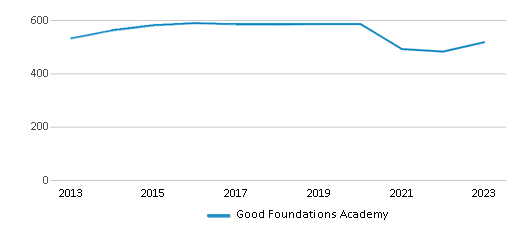
Gender %
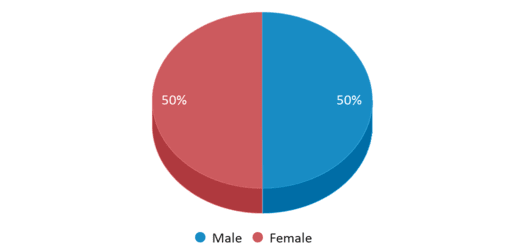
Total Classroom Teachers
23 teachers
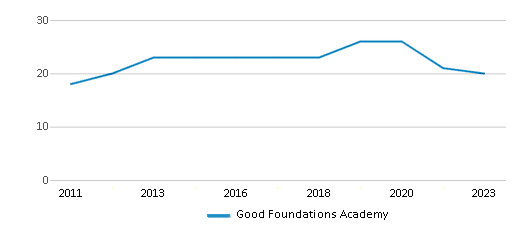
Students by Grade
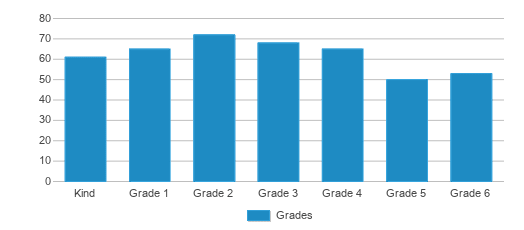
School Rankings
Good Foundations Academy ranks within the bottom 50% of all 975 schools in Utah (based off of combined math and reading proficiency testing data).
The diversity score of Good Foundations Academy is 0.50, which is more than the diversity score at state average of 0.46. The school's diversity has stayed relatively flat over five school years.
Overall Testing Rank
#506 out of 975 schools
(Bottom 50%)
(Bottom 50%)
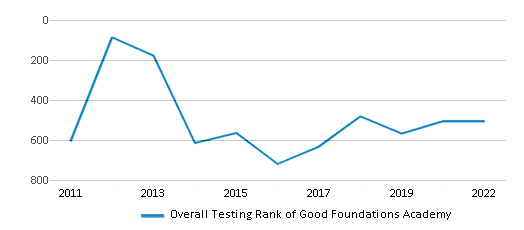
Math Test Scores (% Proficient)
(20-21)41%
39%
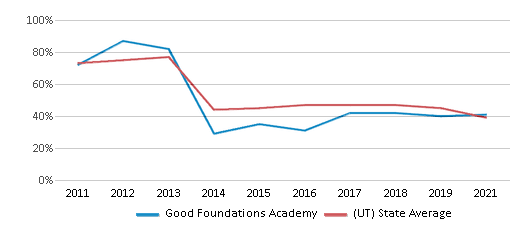
Reading/Language Arts Test Scores (% Proficient)
(20-21)41%
43%
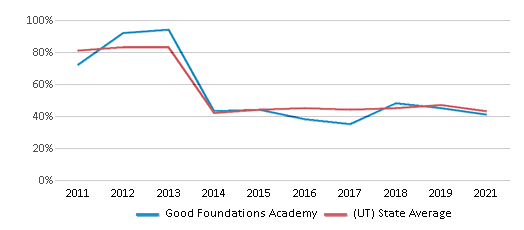
Science Test Scores (% Proficient)
(20-21)50-54%
45%
Student : Teacher Ratio
19:1
21:1
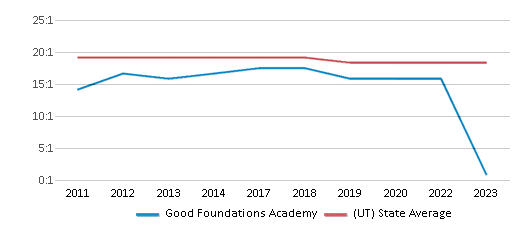
American Indian
n/a
1%
Asian
1%
2%
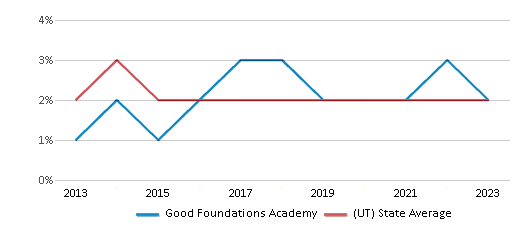
Hispanic
25%
20%
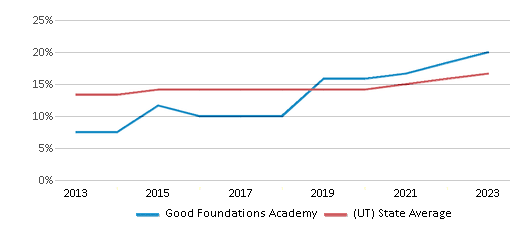
Black
1%
1%
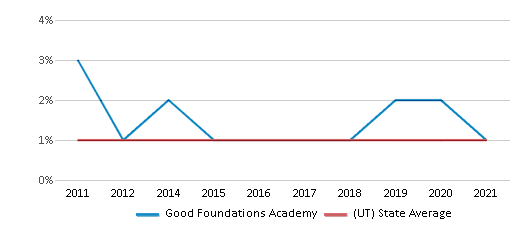
White
66%
71%
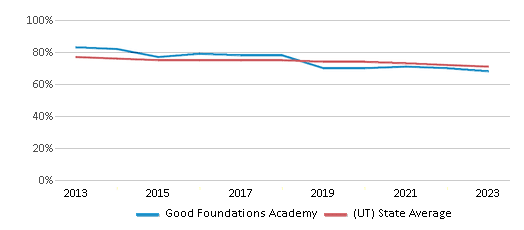
Hawaiian
3%
1%
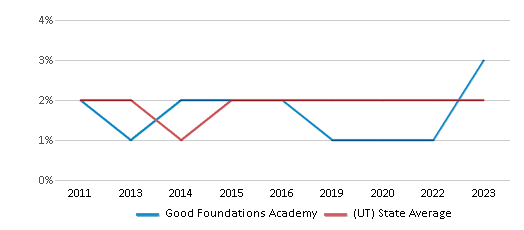
Two or more races
4%
4%
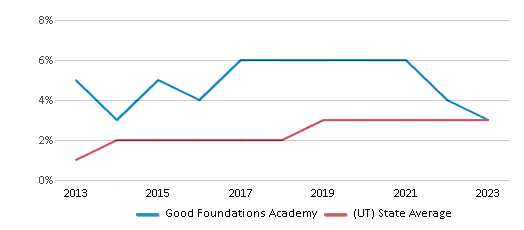
All Ethnic Groups
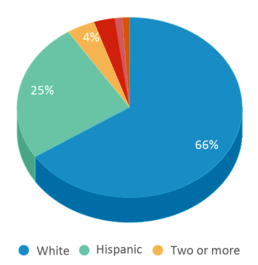
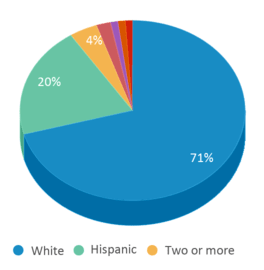
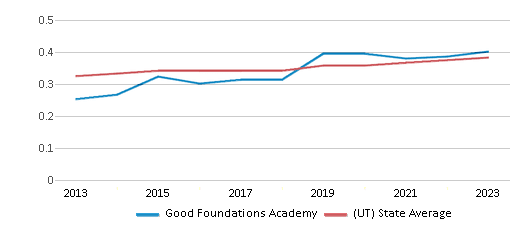
Eligible for Free Lunch
26%
24%
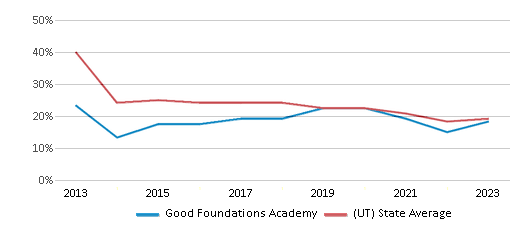
Eligible for Reduced Lunch
8%
6%
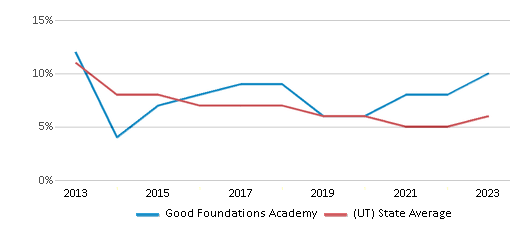
School Statewide Testing
School District Name
Source: National Center for Education Statistics (NCES), UT Dept. of Education
Profile last updated: 02/09/2025
Frequently Asked Questions
What is Good Foundations Academy's ranking?
Good Foundations Academy is ranked #506 out of 975 schools, which ranks it among the bottom 50% of public schools in Utah.
What percent of students have achieved state testing proficiency in math and reading?
41% of students have achieved math proficiency (compared to the 39% UT state average), while 41% of students have achieved reading proficiency (compared to the 43% UT state average).
How many students attend Good Foundations Academy?
434 students attend Good Foundations Academy.
What is the racial composition of the student body?
66% of Good Foundations Academy students are White, 25% of students are Hispanic, 4% of students are Two or more races, 3% of students are Hawaiian, 1% of students are Asian, and 1% of students are Black.
What is the student:teacher ratio of Good Foundations Academy?
Good Foundations Academy has a student ration of 19:1, which is lower than the Utah state average of 21:1.
What grades does Good Foundations Academy offer ?
Good Foundations Academy offers enrollment in grades Kindergarten-6
What school district is Good Foundations Academy part of?
Good Foundations Academy is part of Good Foundations Academy School District.
School Reviews
5 7/19/2017
Two of my children attend this wonderful charter school. My son had previously been in a gifted program in the Davis School District, so I'd like to commend GFA's curriculum that really builds on civic responsibility, math skills, history, ELA, and the arts. Our son has grown to love math now and is not memorizing concepts, rather mastering them as he had in his previous gifted program. My daughter enjoys all of her subjects and isn't weary of math or the sciences. This school has by far been the best choice for my children and they excel in all of their subjects. I will miss Mr. Petersen, but the new director is from NUAMES, an excellent charter high school out of Layton so our kids are in great hands!
1 6/23/2017
If you really want your children to get education stay away from this school. Very poor program and low quality of teaching.
5 11/25/2016
Two of my children attended Good Foundations from the day it opened. I have nothing negative to say. For the four years my children attend there, It was all positive. The staff are truly amazing! They hire only the best and require much more then an application to apply there. They won't even allow a substitute that does not have a bachelors degree. Those four years taught my children a tremendous amount and has really helped them as they have transitioned into Jr. High and High School.
Review Good Foundations Academy. Reviews should be a few sentences in length. Please include any comments on:
- Quality of academic programs, teachers, and facilities
- Availability of music, art, sports and other extracurricular activities
Recent Articles

What Is A Charter School?
Explore the world of charter schools in this comprehensive guide. Learn about their history, how they operate, and the pros and cons of this educational innovation. Discover key facts about charter schools, including admission policies, demographics, and funding, as well as what to look for when considering a charter school for your child.

10 Reasons Why High School Sports Benefit Students
Discover the 10 compelling reasons why high school sports are beneficial for students. This comprehensive article explores how athletics enhance academic performance, foster personal growth, and develop crucial life skills. From improved fitness and time management to leadership development and community representation, learn why participating in high school sports can be a game-changer for students' overall success and well-being.

February 05, 2025
Understanding the U.S. Department of Education: Structure, Impact, and EvolutionWe explore how the Department of Education shapes American education, from its cabinet-level leadership to its impact on millions of students, written for general audiences seeking clarity on this vital institution.
















